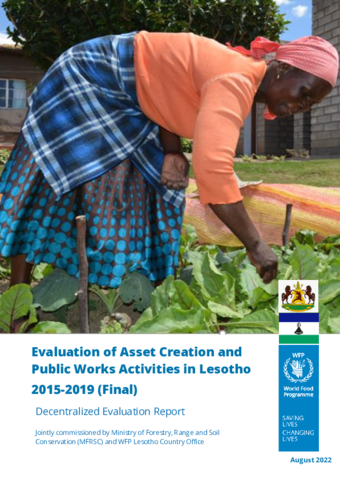
The evaluation focused on assessing the relevance, effectiveness, efficiency, impact, and sustainability and scalability of the programme.
The evaluation had two complementary objectives (learning and accountability): (1) Accountability entailed assessing the effectiveness, efficiency, performance and results of FFA activities implemented through previous Country Programme, Protracted Relief and Recovery Operation, the Transitional Interim Country Strategic Plan (T-ICSP) and the WFP technical assistance to the Poverty Alleviation Programme (PAP) (“the Pilot”) implemented by MFRSC, (2) Learning entailed determining why specific results occurred or did not occur in order to highlight good practices and areas for improvement and (3) Another objective was to understand the extent to which the FFA and Pilot activities considered gender and human rights related issues.
The evaluation concluded that:
- Although WFP emphasized vulnerability targeting and GEWE mainstreaming on paper, this was only partly achieved in practice due to design, programming, and implementation flaws.
- The lack of strategic frameworks and programming tools, insufficient capacity development, and limited sustainability considerations were other challenges. However, the evaluation found positive results in terms of enhanced food and nutrition security, GEWE and environmental impact.
- Attention to the identified issues is required to improve vulnerability targeting, effectiveness and sustainability of assets and livelihood activities, not least considering the planned handing-over of FFA assets and the upscaling of Pilot components.
Some key recommendations from the evaluation included:
- WFP/MFRSC to implement a control mechanism to guarantee that participants at asset development sites are chosen based on vulnerability (rather than "first-come, first-served").
- WFP/MFRSC should guarantee thorough beneficiary engagement on the kind and location of community assets, as well as the timing of asset creation work.
- WFP to ensure that asset creation and livelihood monitoring systems include additional gender-sensitive, disability, livelihood, and environmental outcome/impact indicators.
- WFP support to the Government of Lesotho should include detailed agreements of area receiving support, strategy and time-bound plans, logical/result frameworks and an associated simple monitoring system.
- To enable upscaling, WFP and MFRSC should refine chosen Pilot components such as vulnerability targeting, asset selection, three months of enrollment, and enhanced M&E.
- WFP asset creation and livelihood activities should be designed and implemented based on sustainability considerations, including selecting environmentally suitable, low-cost, low maintenance/low-input assets and livelihood activities; developing systems for community-led management and maintenance; and handover strategy in place from the project start.
- Ensure WFP capacity development activities include a needs assessment; training modules and tools; and training evaluation focusing on the quality of the training and its impact.
